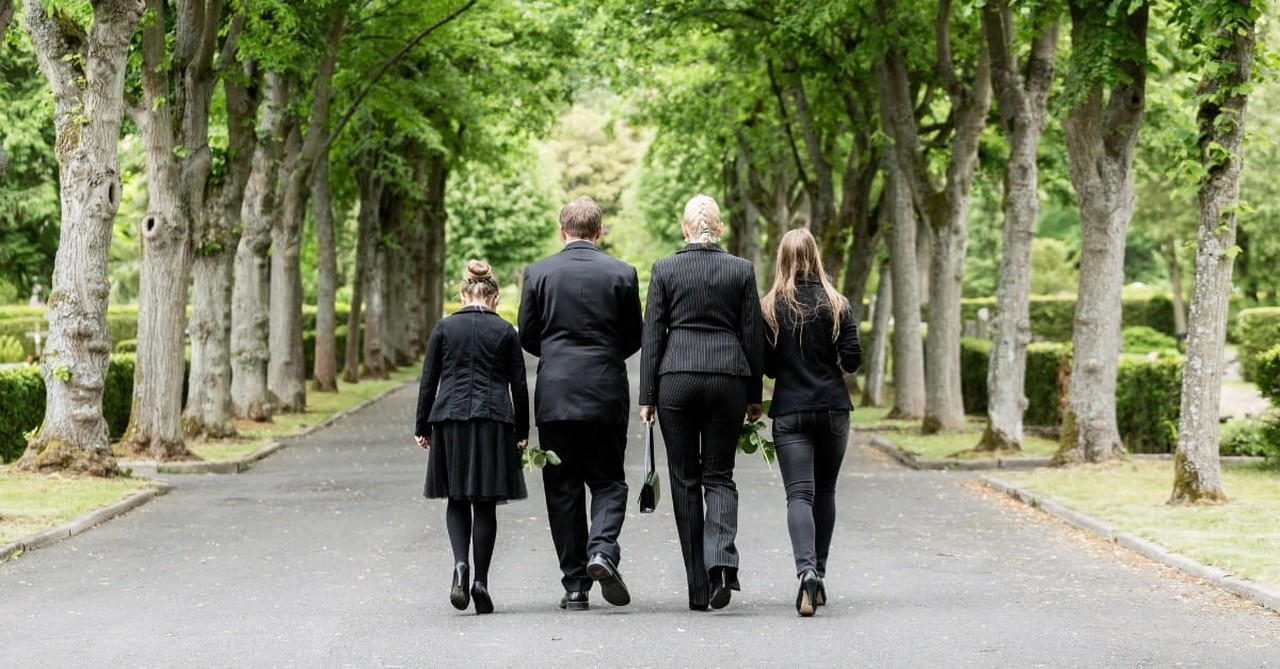
“I just can’t believe all those (Bible) stories,” my friend said. “They’re just fables.”
I’d prayed for her, and I even wrote a letter sharing my faith with her. During the weeks before her death, godly friends visited her and shared the Gospel. People in several churches prayed for a softening of her heart toward spiritual things. To my knowledge, my friend died without placing her faith in Jesus.
Her funeral was one of the saddest experiences I’ve ever endured.
In 1 Thessalonians 4:13-14, the apostle Paul tells believers facing the death of someone who has died in Christ, “that you may not grieve as others do who have no hope. For since we believe that Jesus died and rose again, even so, through Jesus, God will bring with him those who have fallen asleep.” This comfort is achingly absent in the death of an unbeliever.
When we attend (or officiate at) their funerals, what should we say?
Photo credit: ©Thinkstock/kzenon
1. I'm Sorry for Your Loss

1. I'm Sorry for Your Loss
SLIDE 1 OF 10
Regardless of the circumstances surrounding a person’s death, one thing is certain – their family is grieving. These five simple words convey heartfelt sympathy and genuine compassion. When accompanied by a tender hug or empathetic pat, they mean the world to those who are hurting.
Unfortunately, people can be incredibly insensitive at funerals—especially funerals for those whose faith was questionable or non-existent. While the person’s eternal destiny is usually on everyone’s mind, it’s never appropriate to speculate aloud. Instead, stick to safe, sincere phrases that express your love for those who are grieving.
Photo credit: Thinkstock
2. I Remember When...

2. I Remember When...
SLIDE 2 OF 10
When my grandmother died, the remarks I treasured most were from those who shared a fun or happy memory. My aunt shared how she and my grandmother loved to eat cake and drink coffee together every Tuesday morning. A neighbor mentioned my grandmother’s green thumb. Another talked about her love for romance novels and soap operas. Each memory they shared was a tiny glimpse into the life of the woman I loved so much.
Romans 12:15 calls us to “Rejoice with those who rejoice; mourn with those who mourn.” As my grandmother’s friends shared their happiest memories of her, they cried, and I did, too. It was healing and therapeutic to share both laughter and tears.
Photo credit: ©Thinkstock/WavebreakmediaLtd
3. One Thing I Always Appreciated about Your Loved One is ____

3. One Thing I Always Appreciated about Your Loved One is ____
SLIDE 3 OF 10
People need to know that their loved ones’ lives mattered. They want to know the world is a better place because they existed, and that others valued them, too. When we talk about the character qualities we most admire in the deceased, we affirm their worth and validate their contributions. This spreads soothing oil on grieving souls.
My friend was a nurse practitioner who loved and cared for those in her practice. As patient after patient paid their respects, they commented on her work ethic, commitment to excellence, and skill as a practitioner. Their words were precious gifts to her family.
Photo credit: ©Thinksock/AntonioGuillem
4. Nothing

4. Nothing
SLIDE 4 OF 10
Sometimes it’s hard to find something positive to say about an unbeliever who has died. Perhaps their lives were characterized by destructive behavior, offenses against their friends and family, or general ill will. Rather than lie, ministering with a hug and your presence says more than empty platitudes or flattering statements everyone knows aren’t true. And a listening ear is often the greatest gift of all.
Photo credit: ©Thinkstock/DragonImages
5. _______'s Death Makes Us Think about Our Own Mortality, Doesn't it?

5. _______'s Death Makes Us Think about Our Own Mortality, Doesn't it?
SLIDE 5 OF 10
The loss of a loved one causes us to ponder life beyond this one. Those who have a relationship with Christ think about streets of gold, worshiping God, and the presence of Jesus. Those who have yet to place their faith in Christ think less happy thoughts. They wonder where they would go if they died. Many are confused, uncomfortable, and frightened.
The death of their loved one or friend reminds them that they won’t live forever. Jumbled thoughts and theologies cause them to weigh their deeds and wonder, Am I good enough? Is God real? If I was lying in that casket, where would my soul be?
Pondering one’s mortality can be a good thing. Even the most pagan have some sense that they’ll have to answer for their deeds. “And inasmuch as it is appointed for men to die once and after this comes judgment,” Hebrews 9:27 reminds us. This introspection can open people’s hearts and minds to the work of the Holy Spirit. Those of us who know Christ can help them find biblical answers to their questions.
Photo credit: ©Thinkstock/LeArchitecto
6. We Don't Know What Decision They Made in the Privacy of Their Hearts

6. We Don't Know What Decision They Made in the Privacy of Their Hearts
SLIDE 6 OF 10
Oftentimes a believing family member will despair because they fear their loved one has died separated from Christ. “I can’t stop thinking about where they are spending eternity,” they say. While we can’t, in good conscience, assure them of their loved one’s salvation, we can point them to the simplicity of the Gospel.
“For whoever will call upon the name of the Lord shall be saved” (Romans 10:13), gives powerful assurance that all it takes for a person to go to heaven is simple surrender of their heart. The thief on the cross lived his life in willful defiance and disregard of God and his principles, yet when he humbled himself and asked Christ to remember him when he came into His kingdom, Jesus assured him, “Today you will be with me in Paradise” (Luke 23:43).
Only God can know for sure whether a person surrendered their heart to Jesus in the minutes, hours, or days preceding their death, but I’m confident that there will be many people in heaven because of deathbed conversions. This hope can bring great comfort to grieving loved ones.
Photo credit: ©Thinkstock
7. God Didn't Allow Them to Die Without Giving Them Every Opportunity to Believe

7. God Didn't Allow Them to Die Without Giving Them Every Opportunity to Believe
SLIDE 7 OF 10
Paired with the preceding truth, this statement quieted my heart during the days following my grandmother’s death. Because God’s overarching purpose is to draw men and women into a relationship with Himself, I was reassured that my grandmother didn’t die before she had every chance to place her faith in Jesus. While God will never overrule someone’s free will, he graciously softens their hearts, surrounds them with evidence of his love, and brings others into their lives to pray for and witness them.
I didn’t have to fear that if she’d just lived a little longer she’d have the final bit of information she needed to make a decision for Christ. “All the days ordained for me were written in your book before one of them came to be,” Psalm 139:16 tells me. God knew the day of my grandmother’s death, and He orchestrated the events of her life to provide everything she needed to make a faith decision.
Photo credit: ©Thinkstock/StockPhotosArt
8. God is a God of Grace and Mercy

8. God is a God of Grace and Mercy
SLIDE 8 OF 10
Of all the characteristics of God, these two give mourners the most hope for their unsaved loved ones. Paired with His longsuffering, God’s grace and mercy remind us He is going to do everything possible to draw our loved ones to Himself. If they need 100 years of life before they come to faith in Him, He’ll give them 100 years. If they need trials and hardship, He’ll bring it. If they spurn His love, spit in His face, and reject His overtures, He’ll continue to pursue them. His relentless love doesn’t give up.
“The Lord is not slow in keeping his promise, as some understand slowness,” 2 Peter 3:9 reassures us, “Instead he is patient with you, not wanting anyone to perish, but everyone to come to repentance.” This promise is a wonderful reminder to grieving friends and family that God has made a way for their loved one to go to heaven and will give them every opportunity to accept His gift of eternal life.
Photo credit:©Thinkstock/GordonImages
9. If _____ Were Here Right Now, He'd Want Me to Tell You about Jesus

9. If _____ Were Here Right Now, He'd Want Me to Tell You about Jesus
SLIDE 9 OF 10
Jesus taught in Luke 16 that when someone dies, their eternity is fixed. If they’ve placed their faith in Him for their salvation, they’ll go to heaven. If they haven’t, they’ll spend eternity separated from Him. At the funeral of an unsaved person, our main concern should be the eternal destinies of those still living, because they still have a chance to choose Christ.
Luke 16 describes a rich man who died apart from Christ: “In hell, where he was in torment, he looked up and saw Abraham far away, with Lazarus by his side” (v. 23). In his agony, his thoughts turned to his loved ones. He cried out to Abraham, “I beg you, father, send Lazarus to my father's house, for I have five brothers. Let him warn them, so that they will not also come to this place of torment” (vs. 27-28). He was concerned about himself, but he was especially distressed at the thought of his family members going to such a torturous place.
At an unsaved person’s funeral, if God grants us the opportunity, we should share the Gospel. It would be what their loved one would want.
Photo credit: ©Thinkstock/BananaStock
10. Don't Wait to Make a Decision for Christ

10. Don't Wait to Make a Decision for Christ
SLIDE 10 OF 10
I shudder to think of the multitudes of people who have postponed committing their lives to Christ. They’re waiting until “later,” or “until I’m older,” or “after I get my life straightened out.” They want to “live a little” before they embrace the faith life.
This attitude assumes God will grant them tomorrow, that they’ll live to a ripe old age and have ample time to plan for their eternity. James 4:14, however, contradicts this line of thinking: “Why, you do not even know what will happen tomorrow. What is your life? You are a mist that appears for a little while and then vanishes.”
2 Corinthians 6:2 urges us, “now is the time of God's favor, now is the day of salvation.” Perhaps the greatest thing we can say to those attending the funeral of an unbeliever is this: “Don’t wait to make a decision for Christ. It will be one decision you’ll never regret.”
Photo credit: ©Thinkstock/KatarzynaBialasiewicz
Lori Hatcher is a blogger, women’s ministry speaker, and author of the Christian Small Publisher’s 2016 Book of the Year, Hungry for God … Starving for Time, Five-Minute Devotions for Busy Women. A Toastmasters International contest-winning speaker, Lori’s goal is to help busy women connect with God in the craziness of everyday life. She especially loves small children, soft animals, and chocolate. You’ll find her pondering the marvelous and the mundane on her blog, Hungry for God. . . Starving for Time. Connect with her on Facebook, Twitter (@lorihatcher2) or Pinterest (Hungry for God).
Originally published October 31, 2017.







